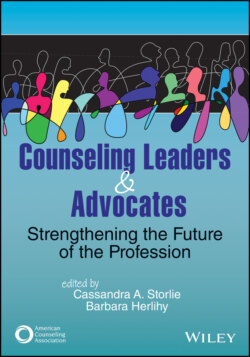Читать книгу Counseling Leaders and Advocates - Группа авторов - Страница 39
Culturally Responsive Counseling Leadership in Action
ОглавлениеAs you reflect on the content of this chapter, we hope you have had the opportunity to consider some of the practical steps you can take to integrate culturally responsive leadership in your practice. We can attest that culturally responsive leaders address issues of oppression, discrimination, and microaggressions in the classroom, while working with clients, and within their supervisory relationships. Culturally responsive counseling leaders are keenly aware of the systems of power and hierarchy that exist within their relationships and act in ways to mitigate those power differentials (Peters et al., 2020). We further recognize that culturally responsive leaders understand the role of culture when diagnosing and treating clients in the community. They utilize the cultural formulation interview (American Psychiatric Association, 2013) when working with clients who have differing identities and concurrently embrace the intersectionality of each unique client.
Cultural responsiveness is also being embraced on behalf of counseling students in hundreds of Chi Sigma Iota (CSI) chapters. As Storlie et al. (2016) confirm, counselor community engagement “may provide a means to respond to and advocate for the needs of marginalized groups in ways that traditional counseling practices have not” (p. 53). In their examination of counselor community engagement activities, the highest reported levels of outreach began with local programs and the most common areas addressed were issues of poverty and mental health. To become culturally responsive leaders, we must move beyond action or intervention itself and evaluate the effectiveness of our actions as seen by the recipients of our services.
Culturally responsive counseling leaders evaluate the outcomes of their actions to ensure that interventions are effective when working with students, clients, supervisees, and the greater community. Counseling leaders can draw feedback from multiple sources to inform their continued use of advocacy action steps and to provide context in their own self-evaluations. This reflexivity supports formal and informal evaluation as an indicator to move forward and does not necessarily need to be solely quantitative in nature. Guth et al. (2019) identified the importance of evaluation through qualitative and quantitative means as catalysts for action to undo hate and oppression. Although they contextualized evaluation specific to group work, they posited that evaluation demonstrates the effectiveness and success of specific interventions and informs reflections for future action, community organizing, and mobilization. Evaluation can institute reflection on the meaning and process of individual and collective change for justice.
